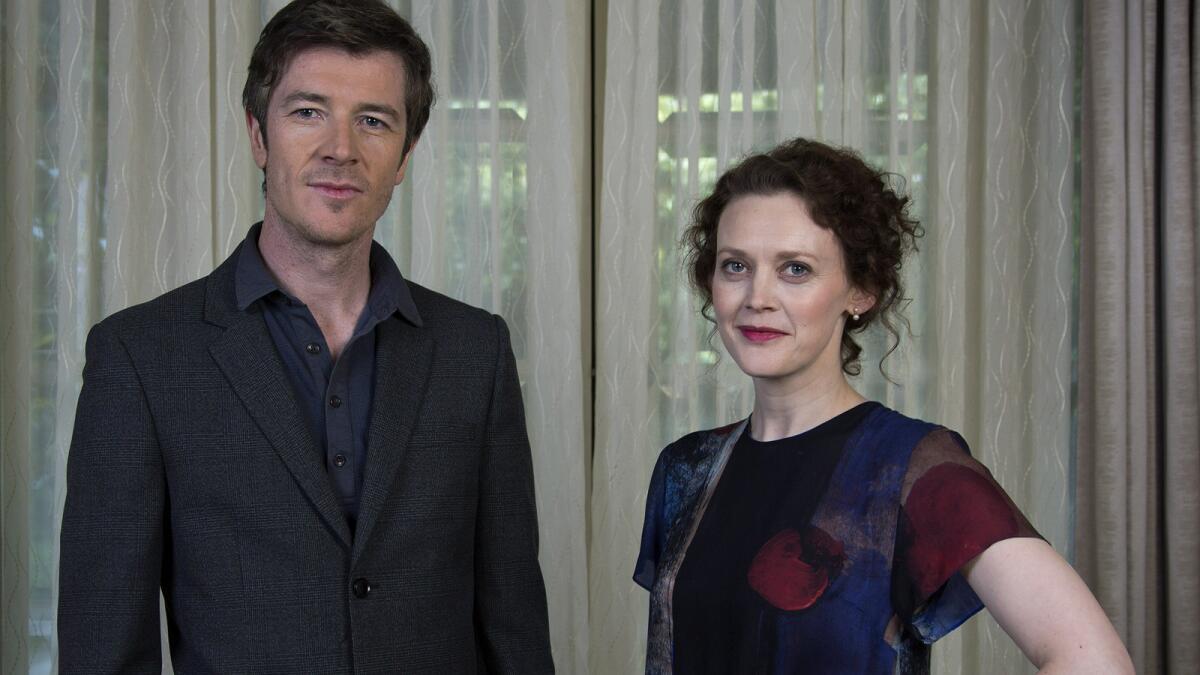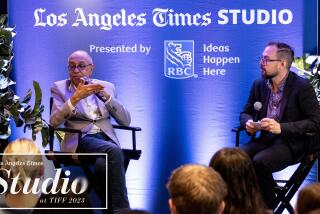Review: ‘Jimmy’s Hall’ is a subdued story of Irish activist Jimmy Gralton

Barry Ward and Simone Kirby star in “Jimmy’s Hall.”
- Share via
There’s a striking juxtaposition in the opening moments of “Jimmy’s Hall” between a zippy, black-and-white montage of Jazz Age New York, vibrant and rollicking, and the hushed green hills of Ireland’s County Leitrim.
That shift encapsulates the situation for the title character, a middle-aged prodigal son returning to his mother’s farm after years abroad. It also sets up an intriguing, dynamic friction — one that gets all but lost in the charming but surprisingly soft-focus movie, the latest in the half-century career of Ken Loach.
------------
FOR THE RECORD:
“Jimmy’s Hall”: A headline in the July 3 Calendar section for a review of the movie “Jimmy’s Hall,” about activist Jimmy Gralton, implied that the film is set after Gralton was deported from Ireland. The film recounts events leading to Gralton’s deportation. —
------------
In what he had said will be his final large-scale feature, the British director brings a sure feel for Ireland’s landscape as well as its strife. Known for his politically charged social realism, Loach turns his attention to an obscure historical figure, activist Jimmy Gralton.
INDIE FOCUS: Sign up for our weekly movies newsletter
The only Irish citizen ever deported from his country, Gralton was labeled an illegal alien without benefit of trial. His communist affiliations and activities, which included proprietorship of a community center and dance hall, had been deemed dangerous by “the masters and the pastors,” as one character in the film describes the ruling class.
Screenwriter Paul Laverty, Loach’s longtime collaborator, found that the details of Gralton’s detention and expatriation have been expunged from official records in Dublin. But even if he’d found a wealth of archival material, it’s clear that he and Loach intend something other than a direct reckoning with the sorry facts. They’re more interested in the communal-spirit angle of this true story.
They capture precisely that, the screen brimming with unfamiliar faces, rough-hewn and lovely. And yet the gentle drama that they’ve fashioned errs on the side of the predictable and reassuring, downplaying the passion and ire of Gralton’s politics.
“Jimmy’s Hall” is set in 1932, a decade after the civil war that Loach and Laverty plumbed in their stirring 2006 Cannes prize winner, “The Wind that Shakes the Barley.” It finds Ireland in the grips of the Great Depression, its political rifts over the Anglo-Irish Treaty far from healed (and, as we know, destined to deepen). Played by Barry Ward with engaging humility, the returning Jimmy is determined to keep a low profile while helping his elderly but sturdy mother (Aileen Henry, wonderful and underused, as are many of the supporting players).
But the villagers, led by a forthright teenager (the overemphatic Aisling Franciosi, of the BBC series “The Fall”), persuade him to reopen Pearse-Connolly Hall, which he’d built 10 years earlier. Run by committee, it’s a hangout and citizens courthouse, offering classes in boxing and poetry. In an irresistible scene, Jimmy christens the reopened venue by cranking up his gramophone and teaching his friends a dance he learned in Harlem.
During its earlier incarnation, the hall was one of the undertakings that made Jimmy a target of the authorities, forcing him to flee the country without the woman he loved, Oonagh (Simone Kirby). Their unconsummated romance, a manufactured element of the story, is tenderly played but adds little that feels urgent and true.
Even more schematic is Jimmy’s adversarial relationship with the passive-aggressive Father Sheridan (Jim Norton), who understands that Jimmy’s integrity makes him a threat. Though their every exchange is designed to hit an obvious point on a familiar plot arc, there’s an electricity to their verbal crossfire, and Norton enhances Laverty’s sharp language with the mellifluous rumble of his voice.
As to Jimmy’s oratory brilliance, it comes to the fore only well into the film, when he puts himself on the line to decry the eviction of tenant laborers. He delivers a hyper-articulate assessment of greed and economic injustice whose contemporary resonance can’t be missed.
But as appealing as Ward’s portrayal is, the film keeps the character’s revolutionary spirit in an unconvincing state of dormancy for much of its running time. As if to ensure that we’ll like him, it cools his fiery edges. A story that might have been alive with messy complexity is instead genial and polite.
------------
‘Jimmy’s Hall’
MPAA rating: PG-13 for language, a scene of violence
Running time: 1 hour, 49 minutes
Playing: Laemmle’s Royal, West Los Angeles
More to Read
Only good movies
Get the Indie Focus newsletter, Mark Olsen's weekly guide to the world of cinema.
You may occasionally receive promotional content from the Los Angeles Times.










